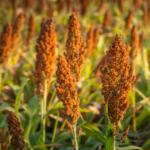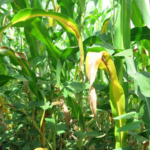


Popular Knowledge Women's Initiative Farmer to Farmer Cooperative Society Limited
12/2016—12/2018
Cassava and cowpea are very important food crops in eastern Uganda. They play key roles in food and nutrition security, respectively. In early 1990s, cassava production in the Teso Region of Eastern Uganda collapsed because of cassava mosaic disease (CMD). As the region recovered from the destructive disease following introduction of resistant varieties, another devastating disease emerged—cassava brown streak disease (CBSD). CBSD causes up to 100% yield loss. Moreover, improved varieties that had been introduced seem to succumb to CBSD within a short period. Farmers fear that introduction of improved varieties is contributing to loss of native varieties that they prefer, which they also believe are more tolerant to CBSD. Cassava and cowpea systems in Uganda also face serious challenges from insect pests. Both the dry cassava chips and cowpea grains are affected by storage pests, which cause loss of food and market value.Many insect pests in the field also attack cowpea and this has led to excessive spraying with pesticides. Some farmers have attempted to reduce excessive spraying by using a variety of cultural practices like intercropping and use of ash and organic concoctions for control and management of cowpea pests and disease. However, these practices have not been extensively validated or documented by farmers. P’KWI proposes to address these challenges by empowering their members to conduct research to assess the effectiveness of indigenous and researcher innovations for managing these problems.Though P’KWI has participated in research before, researchers from outside of the community have always decided the research agenda for them. With this project, the farmers are in the drivers seat; they have specified a research agenda that focuses on integrated crop management approaches, field pests, diseases, and post-harvest problems for cassava and cowpea crops. This will be the first project in our region where farmers will be in the lead role.We also expect to learn much about farmer networking processes from this grant. P’KWI will be harnessing their organizational structure, which manages heterogeneous sub-clusters of farmers for collective marketing, to collectively engage in participatory identification, evaluation and validation of indigenous and introduced field and storage management strategies for pests and diseases of cassava and cowpeas. This organizational structure begins with clubs of five households each who trust one another. Five households clubs make up an economic group, five to ten economic groups constitute a sub-cluster, and sub-clusters make up the P’KWI community. Through this model, P’KWI can efficiently network the group members so that they explicitly share their experiences, observations, and research results, thereby fostering greater research ownership and deeper discussions among the farmers. The latter could potentially lead to new avenues of discovery that were previously missed by researchers.The project intervention will reach 2,500 households—representing 15,000 individuals—as direct beneficiaries, with potential extension to neighboring communities and boundary partners. In addition, the project will provide a platform for knowledge co-creation and co-generation between research users (P’KWI) and researchers.
OutputsDevelopment and dissemination of strategies for management of field pests and diseases on cassava and cowpea suited to the local situationsDevelopment and dissemination of post-harvest and storage management practices for cassava and cowpea suited for local contextsEstablishment of a network of P’KWI group members to share experiences, observations and research results to create ownership and deeper discussions amongst farmersOutcomesUtilization of technologies and innovations suited to the local conditionsEffective systems amongst farmers for conducting research, sharing and dissemination of knowledge, information and technologiesEnhanced interaction between farmers and other stakeholders for the good of the farmers
Outputs
Outcomes

